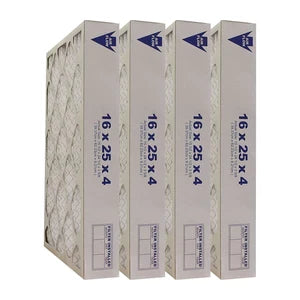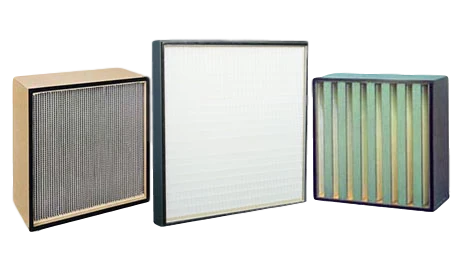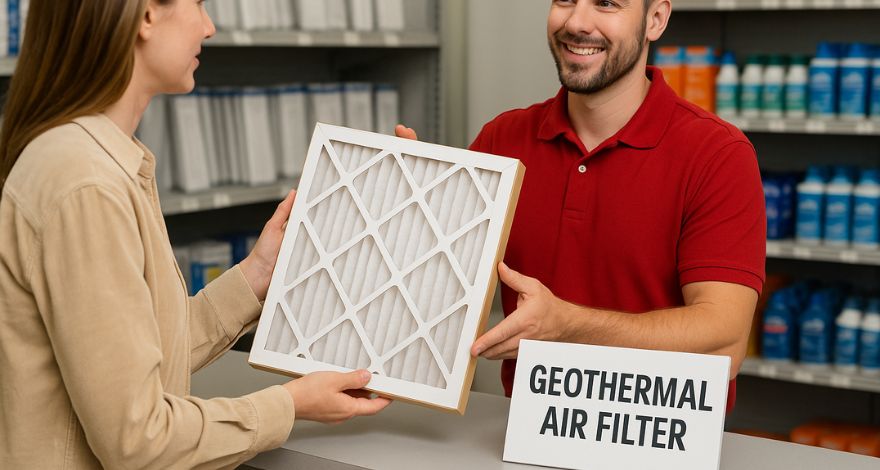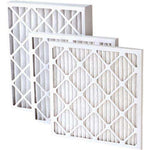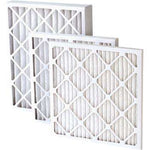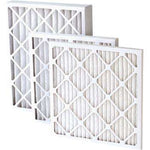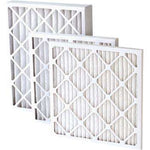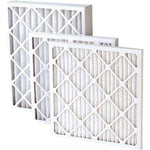Vous avez pas d'articles dans votre panier.
Do Geothermal Systems Need a Special Geothermal Air Filter? Here’s the Answer
Do I need a special geothermal air filter for my system? Or will standard furnace filters do the job? Customers ask this all the time.
A geothermal heating system pulls energy from underground, so it feels more advanced than a traditional furnace. That leads many people to assume that the filters must be different, too.
In reality, the filter in a geothermal system serves the same purpose as any other: it cleans the air you breathe, protects your equipment from dust buildup, and supports efficient airflow.
The difference comes down to filter size, MERV rating, and the design of your geothermal HVAC system.
In this article, we'll walk you through how geothermal systems work and why the right filter matters.
You’ll learn when a dedicated geothermal furnace filter is necessary. Plus, we'll tell you when standard furnace filters are a better match.
This guide will also discuss the most common filter sizes, how to avoid ordering mistakes, and which MERV ratings work best for your home.

How Does a Geothermal System Work?
To understand why a geothermal air filter plays such an important role, you first need to see how these systems operate.
Unlike a gas furnace that burns fuel or a central air conditioner that relies on outdoor air, a geothermal heating system taps into the earth’s steady underground temperature to keep your home comfortable year-round.
A series of buried pipes, or ground loops, circulates water or refrigerant. These loops connect to a heat pump inside your home, creating a closed cycle of energy transfer.
-
During geothermal heating, the system pulls stored warmth from the ground and delivers it indoors.
-
During geothermal cooling, the process reverses. The system extracts heat from your living space and pushes it back into the earth.
The heat pump then distributes conditioned air through ductwork, just as a geothermal HVAC system or a traditional furnace would. That airflow must pass through a filter before reaching your rooms.
A geothermal furnace filter traps dust, pollen, mould spores, and other airborne particles. As a result, you get a healthy indoor environment for all of your family members to enjoy.
However, without a properly sized geothermal filter, your system loses efficiency. Dust and debris collect on coils and blower motors, forcing the equipment to work harder.
Over time, this can lead to higher energy bills, unnecessary repairs, or even premature failure of the system.
In many cases, you can use standard furnace filters if they match the size and airflow requirements. Nevertheless, certain systems demand a dedicated geothermal filter. For example, this is the case with a geothermal air filter 30x32x2.
That’s why choosing the right filter matters.
A clean, well-fitted filter keeps your geothermal heating and cooling system efficient, and your furnace protected from costly damage.

Every Geothermal System Needs an Air Filter: Find Out Why Below
Every geothermal system relies on a filter to keep both your home and your equipment protected.
A properly sized geothermal air filter stops dust and directly affects how clean your indoor air feels.
It also affects how efficiently your geothermal heating system runs and how long your equipment lasts.
-
Protecting Indoor Air Quality
Do you or a family member suffer from nasty allergies? Your filter acts as the first line of defence against allergens and pollutants.
As air circulates through your geothermal HVAC system, the filter captures pollen, dust, pet dander, and mould spores.
Without this barrier, those particles recirculate into every room.
A high-quality geothermal furnace filter creates a noticeable difference for anyone sensitive to allergens.
-
Maintaining Efficiency
Obviously, clean filters keep air moving freely. When a filter clogs, the blower motor struggles to push air through the ductwork.
That strain reduces airflow, forces the system to work harder, and increases energy use.
By changing your geothermal filter on schedule, you avoid all of this. You allow your geothermal heating and cooling system to perform the way it should.
-
Extending Equipment Life
Dust and debris that slip past a filter settle on coils, fans, and motors.
Over time, that buildup causes overheating, wear, and breakdowns. A reliable geothermal air filter prevents this damage, helping your system last for decades rather than failing early.
Compared to costly repairs or replacements, filters are a simple investment that protects the heart of your system.
In August, we worked with a homeowner who delayed changing their geothermal furnace filter for over a year.
Their coils became clogged during the peak of summer geothermal cooling, and the entire system struggled to keep up.
Once we installed the correct filter, airflow returned to normal. That experience proved how much difference a simple filter makes.

Do Geothermal Systems Require Special Filters?
It depends on the design. Some units work with common filter sizes. Others require a dedicated geothermal furnace filter with exact dimensions.
When Do Standard Furnace Filters Work?
If your system calls for a common size like 16x25x1 or 20x20x2, you can often install standard furnace filters without any problem.
These filters come in multiple MERV ratings. For example, MERV 8, MERV 11 furnace filters, and MERV 13.
These options allow you to choose the right balance between airflow and filtration.
We also worked with a family in Oakville who believed their unit needed a costly OEM geothermal filter. Their system used a 16x25x1 size, which looked proprietary at first look.
After reviewing the specifications, we found that one of our MERV 11 furnace filters from the standard line fit perfectly. They avoided paying premium OEM prices, and their home enjoyed healthy airflow right away.

When Do You Need a Geothermal Furnace Filter?
As you're aware, not all systems fit standard sizes.
Some require unique options like a geothermal air filter 30x32x2. Others need 5-inch filters with slightly different actual dimensions.
In these cases, standard furnace filters will not seal properly, and air may bypass the media.
To avoid problems like poor IAQ, always check the actual size on your existing filter frame.
OEM manufacturers often adjust dimensions slightly to push homeowners toward their branded products.
At United Filter, we manufacture aftermarket geothermal furnace filters in those precise measurements, so you can protect your system without overspending.
Let's Talk About Geothermal Air Filter Sizes
A geothermal air filter comes in many sizes, and knowing the difference between nominal and actual measurements makes all the difference when ordering.
The nominal size is the round number you'll see on packaging. The actual size is the exact measurement of the filter.
Homeowners often confuse the two, which leads to incorrect orders.
If you have any doubts or questions about the right size for you, feel free to contact our experts for advice.
The Most Common Geothermal Furnace Filter Sizes
Some of the most common options we see include:
-
16x25x1
-
20x20x2
-
20x25x4
-
Geothermal air filter 30x32x2
-
5-inch variations with actual sizes ranging between 4-3/8 and 5-1/4 inches
These sizes may look standard, but in practice, the actual dimensions can vary by manufacturer.

Geothermal Filters vs. Standard Furnace Filters
A geothermal air filter and standard furnace filters achieve the same goal: they remove contaminants, protect equipment, and support healthy indoor air.
The main contrasts appear in material design, sizing, system performance, and pricing.
-
Materials
Both geothermal furnace filters and traditional options rely on pleated synthetic media.
Some versions use electrostatic properties that attract fine particles such as pet dander or smoke. In construction, they share nearly identical features.
-
Sizes
Dimensions create the biggest distinction. Standard furnace filters come in accessible options like 16x25x1 or 20x20x2.
A geothermal filter may require fewer common measurements. This includes a geothermal air filter 30x32x2 or specialized 5-inch variations with specific actual sizes.
-
Performance
Both types reach high MERV ratings, including MERV 11 furnace filters and MERV 13. With the correct size, either option protects a geothermal heating system from dust, pollen, and other particles while maintaining reliable airflow.
-
Cost
Price differences often confuse homeowners. OEM geothermal products usually carry a higher cost despite using the same materials as aftermarket alternatives.
At United Filter, we supply Canadian-made geothermal air filters. You’ll also find standard furnace filters that deliver equal results without inflated expenses.
By weighing dimensions, airflow needs, and overall value, you can determine whether your setup works best with standard furnace filters or a more dedicated option.

Choosing the Right MERV Rating for a Geothermal Air Filter
When you select a geothermal air filter, the MERV rating determines how effectively it traps particles.
MERV stands for Minimum Efficiency Reporting Value, and it ranges from 1 to 16 for residential systems. Higher numbers capture smaller particles, but they also create more resistance to airflow.
Matching the right rating to your geothermal HVAC system keeps the air clean while maintaining steady performance.
At United Filter, we provide three common options: MERV 8, MERV 11 furnace filters, and MERV 13.
-
MERV 8: This level blocks dust, pollen, and large debris. It suits homes without pets, asthma, or allergy concerns.
If you only need basic protection, a MERV 8 filter keeps your geothermal heating system running smoothly without restricting airflow.
-
MERV 11 furnace filters: This option captures smaller particles, including mould spores and pet dander.
We recommend it for most geothermal heating and cooling systems because it balances filtration strength with efficient airflow.
In our experience, MERV 11 offers the best protection for everyday households without stressing the blower motor.
-
MERV 13: This rating removes fine particles such as smoke, bacteria, and airborne pollutants. It delivers the best air filters for furnace setups in homes where health sensitivity is a priority.
Before choosing MERV 13, always check whether your geothermal furnace filter slot can handle the added resistance. Some older blowers may struggle with higher-rated filters.
Our Recommendation
For most geothermal systems, MERV 11 works as the ideal choice. It captures the majority of allergens and fine dust while allowing your geothermal filter to maintain steady airflow.
Unless your home requires advanced protection due to medical needs, MERV 11 strikes the right balance between indoor air quality and system performance.
Replacement Schedule for Geothermal Air Filters
Choosing the right geothermal air filter matters, but replacing it on time makes just as much difference.
A fresh filter keeps your geothermal HVAC system efficient. If you delay replacement, dust builds up, airflow drops, and your geothermal furnace filter struggles to do its job.
Here’s a reliable schedule for different filter thicknesses:
-
1-inch filters: Replace every 1–3 months.
-
2–4-inch filters: Replace every 3–6 months.
-
5-inch filters: Replace every 6–12 months.
Your household environment can shorten these timelines. Homes with multiple pets, allergies, or heavy dust should change filters more frequently.
In those situations, even a MERV 11 furnace filter may clog faster.
So, we often remind customers that a filter costs far less than a repair.
A neglected geothermal filter can overwork the blower motor and lead to expensive service calls. By following a consistent schedule, you extend the life of your system and keep your home’s air quality at its best.

Buying Geothermal and Standard Furnace Filters
Finding the right geothermal air filter or a set of standard furnace filters doesn’t need to feel complicated.
With a few simple steps, you can order the correct product, save money, and keep your system running smoothly.
1. Measure the actual size: Look at the dimensions on your current filter frame, then confirm them with a tape measure.
Many geothermal furnace filter sizes differ slightly from the nominal size on the box, so relying only on that number often leads to mistakes.
2. Choose the right MERV rating: Balance filtration with airflow. For example, MERV 11 furnace filters usually provide the best mix of performance and efficiency for most geothermal heating and cooling systems.
3. Buy in bulk: Ordering discount furnace filters in multi-packs saves money and ensures you always have a replacement ready. This simple habit helps you stick to your replacement schedule without last-minute store runs.
4. Look for Canadian suppliers: If you live in Canada, support your local supplier.
Also, ordering furnace filters in Canada often means faster delivery and better availability of unique sizes, including harder-to-find geothermal options. For example, a geothermal air filter 30x32x2.
By following these steps, you make the process simple and reliable.
Do you need a special geothermal furnace filter? Or perhaps a box of standard furnace filters to stock up? You can order confidently and keep your geothermal HVAC system performing at its best.
Final Thoughts: Geothermal Air Filter or Standard Furnace Filters?
Most geothermal systems operate well with standard furnace filters when airflow capacity and sizing align.
Certain installations, however, require a specific geothermal furnace filter in uncommon dimensions. This includes a geothermal air filter 30x32x2.
If you use the wrong option, you'll just waste money and deal with airflow problems or installation delays.
Unfortunately, we have met homeowners who relied on nominal measurements, only to find that their geothermal heating system needed a different actual size.
Always verify dimensions carefully and select an appropriate MERV rating. This way, you'll protect components, maintain clean indoor air, and support the efficient operation of your geothermal HVAC system.
At United Filter, we supply a broad range of geothermal air filters and standard furnace filters for homes across Canada and the USA.
If you’re looking for the best air filters for furnace systems, our Canadian-made products deliver dependable performance and long-term value.
Browse our collection today and choose custom or standard furnace filters that match your needs with confidence.
Do Geothermal Systems Need a Special Geothermal Air Filter? Here’s the Answer
Do I need a special geothermal air filter for my system? Or will standard furnace filters do the job? Customers ask this all the time.
A geothermal heating system pulls energy from underground, so it feels more advanced than a traditional furnace. That leads many people to assume that the filters must be different, too.
In reality, the filter in a geothermal system serves the same purpose as any other: it cleans the air you breathe, protects your equipment from dust buildup, and supports efficient airflow.
The difference comes down to filter size, MERV rating, and the design of your geothermal HVAC system.
In this article, we'll walk you through how geothermal systems work and why the right filter matters.
You’ll learn when a dedicated geothermal furnace filter is necessary. Plus, we'll tell you when standard furnace filters are a better match.
This guide will also discuss the most common filter sizes, how to avoid ordering mistakes, and which MERV ratings work best for your home.

How Does a Geothermal System Work?
To understand why a geothermal air filter plays such an important role, you first need to see how these systems operate.
Unlike a gas furnace that burns fuel or a central air conditioner that relies on outdoor air, a geothermal heating system taps into the earth’s steady underground temperature to keep your home comfortable year-round.
A series of buried pipes, or ground loops, circulates water or refrigerant. These loops connect to a heat pump inside your home, creating a closed cycle of energy transfer.
-
During geothermal heating, the system pulls stored warmth from the ground and delivers it indoors.
-
During geothermal cooling, the process reverses. The system extracts heat from your living space and pushes it back into the earth.
The heat pump then distributes conditioned air through ductwork, just as a geothermal HVAC system or a traditional furnace would. That airflow must pass through a filter before reaching your rooms.
A geothermal furnace filter traps dust, pollen, mould spores, and other airborne particles. As a result, you get a healthy indoor environment for all of your family members to enjoy.
However, without a properly sized geothermal filter, your system loses efficiency. Dust and debris collect on coils and blower motors, forcing the equipment to work harder.
Over time, this can lead to higher energy bills, unnecessary repairs, or even premature failure of the system.
In many cases, you can use standard furnace filters if they match the size and airflow requirements. Nevertheless, certain systems demand a dedicated geothermal filter. For example, this is the case with a geothermal air filter 30x32x2.
That’s why choosing the right filter matters.
A clean, well-fitted filter keeps your geothermal heating and cooling system efficient, and your furnace protected from costly damage.

Every Geothermal System Needs an Air Filter: Find Out Why Below
Every geothermal system relies on a filter to keep both your home and your equipment protected.
A properly sized geothermal air filter stops dust and directly affects how clean your indoor air feels.
It also affects how efficiently your geothermal heating system runs and how long your equipment lasts.
-
Protecting Indoor Air Quality
Do you or a family member suffer from nasty allergies? Your filter acts as the first line of defence against allergens and pollutants.
As air circulates through your geothermal HVAC system, the filter captures pollen, dust, pet dander, and mould spores.
Without this barrier, those particles recirculate into every room.
A high-quality geothermal furnace filter creates a noticeable difference for anyone sensitive to allergens.
-
Maintaining Efficiency
Obviously, clean filters keep air moving freely. When a filter clogs, the blower motor struggles to push air through the ductwork.
That strain reduces airflow, forces the system to work harder, and increases energy use.
By changing your geothermal filter on schedule, you avoid all of this. You allow your geothermal heating and cooling system to perform the way it should.
-
Extending Equipment Life
Dust and debris that slip past a filter settle on coils, fans, and motors.
Over time, that buildup causes overheating, wear, and breakdowns. A reliable geothermal air filter prevents this damage, helping your system last for decades rather than failing early.
Compared to costly repairs or replacements, filters are a simple investment that protects the heart of your system.
In August, we worked with a homeowner who delayed changing their geothermal furnace filter for over a year.
Their coils became clogged during the peak of summer geothermal cooling, and the entire system struggled to keep up.
Once we installed the correct filter, airflow returned to normal. That experience proved how much difference a simple filter makes.

Do Geothermal Systems Require Special Filters?
It depends on the design. Some units work with common filter sizes. Others require a dedicated geothermal furnace filter with exact dimensions.
When Do Standard Furnace Filters Work?
If your system calls for a common size like 16x25x1 or 20x20x2, you can often install standard furnace filters without any problem.
These filters come in multiple MERV ratings. For example, MERV 8, MERV 11 furnace filters, and MERV 13.
These options allow you to choose the right balance between airflow and filtration.
We also worked with a family in Oakville who believed their unit needed a costly OEM geothermal filter. Their system used a 16x25x1 size, which looked proprietary at first look.
After reviewing the specifications, we found that one of our MERV 11 furnace filters from the standard line fit perfectly. They avoided paying premium OEM prices, and their home enjoyed healthy airflow right away.

When Do You Need a Geothermal Furnace Filter?
As you're aware, not all systems fit standard sizes.
Some require unique options like a geothermal air filter 30x32x2. Others need 5-inch filters with slightly different actual dimensions.
In these cases, standard furnace filters will not seal properly, and air may bypass the media.
To avoid problems like poor IAQ, always check the actual size on your existing filter frame.
OEM manufacturers often adjust dimensions slightly to push homeowners toward their branded products.
At United Filter, we manufacture aftermarket geothermal furnace filters in those precise measurements, so you can protect your system without overspending.
Let's Talk About Geothermal Air Filter Sizes
A geothermal air filter comes in many sizes, and knowing the difference between nominal and actual measurements makes all the difference when ordering.
The nominal size is the round number you'll see on packaging. The actual size is the exact measurement of the filter.
Homeowners often confuse the two, which leads to incorrect orders.
If you have any doubts or questions about the right size for you, feel free to contact our experts for advice.
The Most Common Geothermal Furnace Filter Sizes
Some of the most common options we see include:
-
16x25x1
-
20x20x2
-
20x25x4
-
Geothermal air filter 30x32x2
-
5-inch variations with actual sizes ranging between 4-3/8 and 5-1/4 inches
These sizes may look standard, but in practice, the actual dimensions can vary by manufacturer.

Geothermal Filters vs. Standard Furnace Filters
A geothermal air filter and standard furnace filters achieve the same goal: they remove contaminants, protect equipment, and support healthy indoor air.
The main contrasts appear in material design, sizing, system performance, and pricing.
-
Materials
Both geothermal furnace filters and traditional options rely on pleated synthetic media.
Some versions use electrostatic properties that attract fine particles such as pet dander or smoke. In construction, they share nearly identical features.
-
Sizes
Dimensions create the biggest distinction. Standard furnace filters come in accessible options like 16x25x1 or 20x20x2.
A geothermal filter may require fewer common measurements. This includes a geothermal air filter 30x32x2 or specialized 5-inch variations with specific actual sizes.
-
Performance
Both types reach high MERV ratings, including MERV 11 furnace filters and MERV 13. With the correct size, either option protects a geothermal heating system from dust, pollen, and other particles while maintaining reliable airflow.
-
Cost
Price differences often confuse homeowners. OEM geothermal products usually carry a higher cost despite using the same materials as aftermarket alternatives.
At United Filter, we supply Canadian-made geothermal air filters. You’ll also find standard furnace filters that deliver equal results without inflated expenses.
By weighing dimensions, airflow needs, and overall value, you can determine whether your setup works best with standard furnace filters or a more dedicated option.

Choosing the Right MERV Rating for a Geothermal Air Filter
When you select a geothermal air filter, the MERV rating determines how effectively it traps particles.
MERV stands for Minimum Efficiency Reporting Value, and it ranges from 1 to 16 for residential systems. Higher numbers capture smaller particles, but they also create more resistance to airflow.
Matching the right rating to your geothermal HVAC system keeps the air clean while maintaining steady performance.
At United Filter, we provide three common options: MERV 8, MERV 11 furnace filters, and MERV 13.
-
MERV 8: This level blocks dust, pollen, and large debris. It suits homes without pets, asthma, or allergy concerns.
If you only need basic protection, a MERV 8 filter keeps your geothermal heating system running smoothly without restricting airflow.
-
MERV 11 furnace filters: This option captures smaller particles, including mould spores and pet dander.
We recommend it for most geothermal heating and cooling systems because it balances filtration strength with efficient airflow.
In our experience, MERV 11 offers the best protection for everyday households without stressing the blower motor.
-
MERV 13: This rating removes fine particles such as smoke, bacteria, and airborne pollutants. It delivers the best air filters for furnace setups in homes where health sensitivity is a priority.
Before choosing MERV 13, always check whether your geothermal furnace filter slot can handle the added resistance. Some older blowers may struggle with higher-rated filters.
Our Recommendation
For most geothermal systems, MERV 11 works as the ideal choice. It captures the majority of allergens and fine dust while allowing your geothermal filter to maintain steady airflow.
Unless your home requires advanced protection due to medical needs, MERV 11 strikes the right balance between indoor air quality and system performance.
Replacement Schedule for Geothermal Air Filters
Choosing the right geothermal air filter matters, but replacing it on time makes just as much difference.
A fresh filter keeps your geothermal HVAC system efficient. If you delay replacement, dust builds up, airflow drops, and your geothermal furnace filter struggles to do its job.
Here’s a reliable schedule for different filter thicknesses:
-
1-inch filters: Replace every 1–3 months.
-
2–4-inch filters: Replace every 3–6 months.
-
5-inch filters: Replace every 6–12 months.
Your household environment can shorten these timelines. Homes with multiple pets, allergies, or heavy dust should change filters more frequently.
In those situations, even a MERV 11 furnace filter may clog faster.
So, we often remind customers that a filter costs far less than a repair.
A neglected geothermal filter can overwork the blower motor and lead to expensive service calls. By following a consistent schedule, you extend the life of your system and keep your home’s air quality at its best.

Buying Geothermal and Standard Furnace Filters
Finding the right geothermal air filter or a set of standard furnace filters doesn’t need to feel complicated.
With a few simple steps, you can order the correct product, save money, and keep your system running smoothly.
1. Measure the actual size: Look at the dimensions on your current filter frame, then confirm them with a tape measure.
Many geothermal furnace filter sizes differ slightly from the nominal size on the box, so relying only on that number often leads to mistakes.
2. Choose the right MERV rating: Balance filtration with airflow. For example, MERV 11 furnace filters usually provide the best mix of performance and efficiency for most geothermal heating and cooling systems.
3. Buy in bulk: Ordering discount furnace filters in multi-packs saves money and ensures you always have a replacement ready. This simple habit helps you stick to your replacement schedule without last-minute store runs.
4. Look for Canadian suppliers: If you live in Canada, support your local supplier.
Also, ordering furnace filters in Canada often means faster delivery and better availability of unique sizes, including harder-to-find geothermal options. For example, a geothermal air filter 30x32x2.
By following these steps, you make the process simple and reliable.
Do you need a special geothermal furnace filter? Or perhaps a box of standard furnace filters to stock up? You can order confidently and keep your geothermal HVAC system performing at its best.
Final Thoughts: Geothermal Air Filter or Standard Furnace Filters?
Most geothermal systems operate well with standard furnace filters when airflow capacity and sizing align.
Certain installations, however, require a specific geothermal furnace filter in uncommon dimensions. This includes a geothermal air filter 30x32x2.
If you use the wrong option, you'll just waste money and deal with airflow problems or installation delays.
Unfortunately, we have met homeowners who relied on nominal measurements, only to find that their geothermal heating system needed a different actual size.
Always verify dimensions carefully and select an appropriate MERV rating. This way, you'll protect components, maintain clean indoor air, and support the efficient operation of your geothermal HVAC system.
At United Filter, we supply a broad range of geothermal air filters and standard furnace filters for homes across Canada and the USA.
If you’re looking for the best air filters for furnace systems, our Canadian-made products deliver dependable performance and long-term value.
Browse our collection today and choose custom or standard furnace filters that match your needs with confidence.
